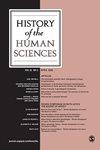终极智库:圣达菲研究所自由意志主义者的崛起
IF 0.5
2区 历史学
Q2 HISTORY & PHILOSOPHY OF SCIENCE
引用次数: 3
摘要
为什么公司和富有的慈善家资助人文科学?本文考察了圣达菲研究所(SFI)的历史,这是一家成立于20世纪80年代初的私人研究所,表明资助者可以在他们资助的科学的社会世界中找到与他们的想法一样多的价值。在20世纪90年代和21世纪初,SFI越来越依赖企业和自由主义商业领袖的资助。与此同时,它的智力工作开始关注适应、创新和分散协调的基本原则,这些原则据说在从生物生态系统到市场和公司的“复杂系统”中发挥作用。这项研究将自由主义经济学家弗里德里希·哈耶克的思想转化为一个新的科学习语。SFI也成为了一个空间,在这里,商业、媒体、学术界和政治界的人物可以学会以一种特殊的方式看待世界——获得我所说的“圣达菲研究所自由意志主义者”的主体性。在SFI,参观者并不是简单地学习新海耶克复杂系统科学的原理。他们开始将自己视为社会进化的推动者,为自由市场体系在没有自上而下的政治指导的情况下生产新技术和解决社会问题的新方案提供了所需的火花。对于该研究所的企业和自由主义金融家来说,SFI不仅仅是一个知识分子用受欢迎的意识形态术语描述世界的空间,也是一个精英行为者致力于建立新的政治经济秩序的空间。本文章由计算机程序翻译,如有差异,请以英文原文为准。
The ultimate think tank: The rise of the Santa Fe Institute libertarian
Why do corporations and wealthy philanthropists fund the human sciences? Examining the history of the Santa Fe Institute (SFI), a private research institute founded in the early 1980s, this article shows that funders can find as much value in the social worlds of the sciences they sponsor as in their ideas. SFI became increasingly dependent on funding from corporations and libertarian business leaders in the 1990s and 2000s. At the same time, its intellectual work came to focus on the underlying principles of adaptation, innovation, and decentralized coordination supposedly at work in ‘complex systems’ from biological ecosystems to markets and firms. This research cast the ideas of the libertarian economist Friedrich Hayek into a new scientific idiom. SFI also became a space where figures in business, media, academia, and politics could come to learn to see the world in a particular way—to acquire the subjectivity of what I call ‘the Santa Fe Institute libertarian’. At SFI, visitors did not simply learn the principles of neo-Hayekian complex system science. They came to see themselves as agents of social evolution, providing the spark that the free-market system needed to produce new technologies and new solutions to social problems without top-down political direction. For the Institute's corporate and libertarian financiers, SFI was not just a space where intellectuals described the world in favored ideological terms, but a space where elite actors became committed to the project of making a new political-economic order.
求助全文
通过发布文献求助,成功后即可免费获取论文全文。
去求助
来源期刊

History of the Human Sciences
综合性期刊-科学史与科学哲学
CiteScore
1.60
自引率
11.10%
发文量
31
审稿时长
>12 weeks
期刊介绍:
History of the Human Sciences aims to expand our understanding of the human world through a broad interdisciplinary approach. The journal will bring you critical articles from sociology, psychology, anthropology and politics, and link their interests with those of philosophy, literary criticism, art history, linguistics, psychoanalysis, aesthetics and law.
 求助内容:
求助内容: 应助结果提醒方式:
应助结果提醒方式:


